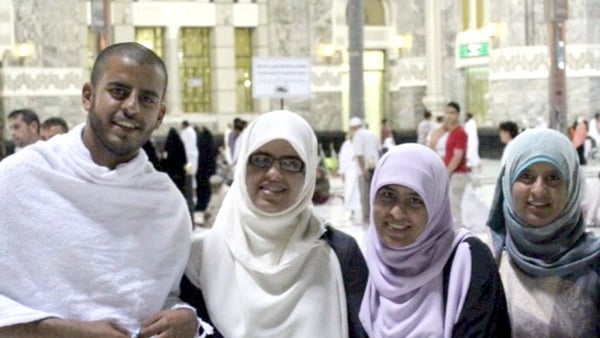The judge in a trial of up to 480 people in Cairo, including an Irish teen, has walked out, saying he refused to continue.
The judge cited 'unease' at the nature of the mass proceedings.
Judge Mahmoud Kamel El-Rashidi left the bench at North Cairo Court claiming he felt uncomfortable about the trial which saw nearly 500 people in the dock over protests at Cairo's Al-Fath mosque following the ouster of former president Mohamed Morsi last year.
Irishman Ibrahim Halawa, 18, is among the defendants.
His sister Somaia Halawa said her brother's lawyer informed her family that lawyers for the defendants had made a joint submission to the judge.
The submission objected to what she described as the "glass cell" in court, where defendants were brought for some or all of the their hearing.
According to the families' lawyer, the judge then refused to continue hearing the case and left the court room.
Ms Halawa said that her family does not know where Ibrahim is this evening.
The anti-death penalty charity, Reprieve, who has been providing assistance to Mr Halawa, said the court read out the names of the prisoners on trial and said Mr Halawa's family were denied entry, despite having permission to attend.
It said the charges against Mr Halawa remain unclear.
Reprieve said Mr Halawa, who was arrested at age 17 last August, is the only European involved in the trial, as far as it knows.
Mr Halawa's family has urged the Government to call for his release.
The Leaving Certificate student from Dublin has been detained in Egypt for almost a year after taking part in a Muslim Brotherhood demonstration in Cairo in August last year.
He is one of 483 defendants who was brought before the court hearing today.
Speaking on RTÉ's Morning Ireland, Somaia said efforts by the Government to ensure her brother was given a fair trial were in vain as "human rights do not really exist in Egypt".
She called on Minister for Foreign Affairs Charlie Flanagan to ask for Mr Halawa's immediate release.
"Ibrahim has been 12 months [in prison] and I think this is enough for him, he needs to ask for Ibrahim's immediate release," she said.
Ms Halawa said her brother had always hoped the Government and the EU would be able to do something for him, but now he was losing hope.
She said her brother was innocent and that no official charge had been put to him.
Mr Halawa was moved to Tora Prison last Thursday ahead of his court appearance.
Egyptian authorities said this was for logistical reasons, as the prison is located beside the court house where the hearing took place.
Mr Halawa was visited by his mother and one of his sisters at the prison over the weekend.
Ms Halawa said her brother was found to be in good health but experiencing some chest and breathing problems, as people are allowed to smoke inside the prison and there is no fresh air.
Flanagan concerned at delays in case
Minister Flanagan has said he is concerned about the delay in the case and that he has spoken to his Egyptian counterpart on several occasions.
The minister said: "Clearly, Ireland cannot interfere with the judicial process in Egypt.
"However, it is my view and, indeed, the Irish Government's view that Ibrahim, as a minor, should not be tried as part of a trial involving a large number of defendants and on the basis of sweeping group charges, but solely on the basis of specific evidence."
He said he stressed that Mr Halawa was only 17 at the time of his arrest and that he intends to return to Ireland to complete his Leaving Certificate.
Mr Flanagan said Irish Ambassador to Egypt Isolde Moylan will continue to provide assistance to the Halawa family.
He said officials from the embassy in Cairo have visited Mr Halawa more than 20 times in the past year.
Ambassador Moylan was in court for today's hearing. A Department of Foreign Affairs official and a representative of the European Union Delegation to Egypt were also at the hearing.
Ambassador Moylan, as well as the department and EU representatives, met one of Mr Halawa's sisters after the court hearing.
No date for a future court hearing has been given.

